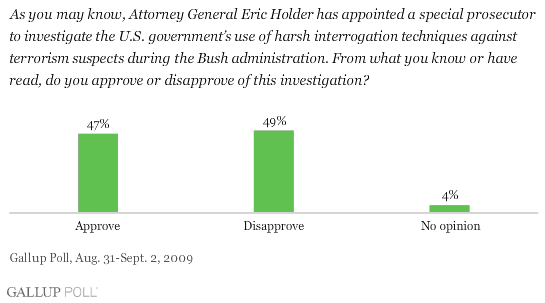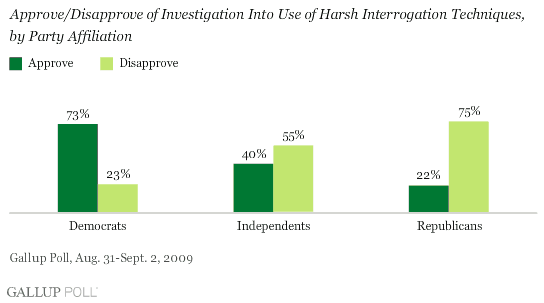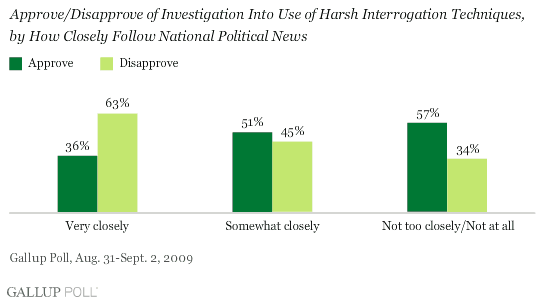PRINCETON, NJ -- The American public is evenly divided on the Justice Department's appointment of a special prosecutor to investigate the Bush administration's use of harsh interrogation techniques on terrorism suspects. A new ���۴�ýPoll finds that 47% of Americans approve and 49% disapprove.

The Obama administration has grappled since it took office with whether to launch a probe into the Bush administration's use of controversial techniques such as waterboarding. Some members of Congress have long called for an investigation, but the president himself has seemed reluctant to back an investigation into the matter, saying he does not want to look backward on this issue. Nevertheless, Attorney General Eric Holder announced last week that his own review of a CIA report that detailed the government's interrogation program prompted him to begin a preliminary investigation into the matter.
The Aug. 31-Sept. 2 ���۴�ýPoll finds that rank-and-file Democrats and Republicans have fairly uniform opposing views on this issue. Seventy-three percent of Democrats approve of the investigation, while 75% of Republicans oppose it. Republican Party leaders, most prominently former Vice President Dick Cheney, have publicly opposed a review of the government's former interrogation methods.
Independents are more likely to disapprove (55%) than to approve (40%) of the probe into Bush-era interrogation methods.

Notably, opposition to the investigation runs much higher among the attentive public -- Americans who say they follow news about national politics "very closely." Among this group, 36% approve and 63% disapprove of the investigation. On the other hand, a majority of Americans who follow national political news less closely approve of the investigation.

The relationship between following the news closely and being more likely to disapprove of the investigation is not merely a function of Republicans (who largely oppose the investigation) disproportionately paying close attention to national political news. The party affiliation of attentive Americans is in fact relatively balanced among Republicans (32%), Democrats (29%), and independents (37%).
Rather, the solid opposition to the investigation among more attentive Americans is due to the fact that Republicans (90% disapprove) and independents (71% disapprove) who follow the news closely are overwhelmingly opposed, much more so than the broader groups of Republicans and independents. Democrats who pay close attention to the news still favor the investigation by a wide margin (74% approve).
Bottom Line
When Attorney General Holder announced the appointment of a special prosecutor to investigate the use of harsh interrogation methods, he acknowledged it would be controversial. The new ���۴�ýdata underscore this assumption, finding a U.S. public that is evenly divided as to whether his decision to pursue an investigation is the right one.
Survey Methods
Results are based on telephone interviews with 1,026 national adults, aged 18 and older, conducted Aug. 31-Sept. 2, 2009. For results based on the total sample of national adults, one can say with 95% confidence that the maximum margin of sampling error is ±4 percentage points.
Interviews are conducted with respondents on land-line telephones (for respondents with a land-line telephone) and cellular phones (for respondents who are cell-phone only).
In addition to sampling error, question wording and practical difficulties in conducting surveys can introduce error or bias into the findings of public opinion polls.
